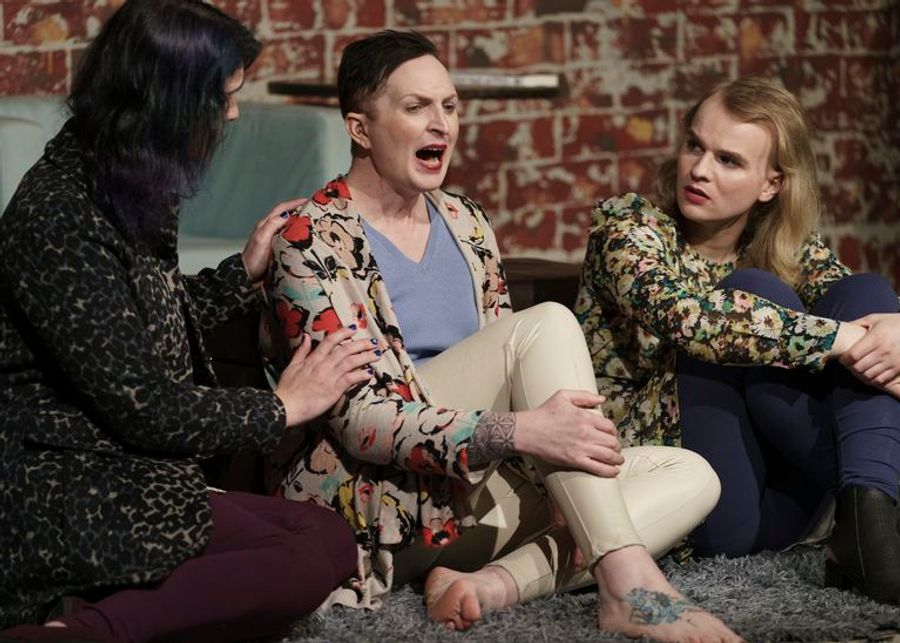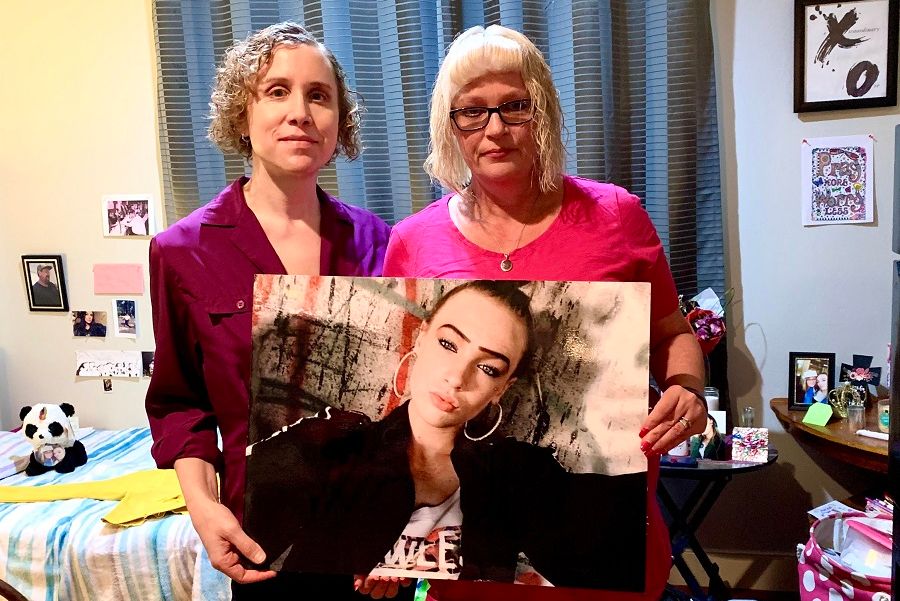LISA: I don’t care what you say. It’s true…I sleep with my phone, hoping she’ll call or text. I watch the videos she made over and over. Why would someone hurt my beautiful, brave girl?
(cries)
I just want her back.
The titular American Girl in Mikki Gillette’s new play is Nikki Kuhnhausen; both the playwright and her leading character are trans. Gillette’s first introduction to Nikki’s story was as an activist rather than a playwright: In 2019, the LGBTQIA+ community in the Pacific Northwest was shaken when Nikki’s remains were found in a secluded wooded area six months after her disappearance. An investigation soon led to the arrest and conviction of David Bogdanov, who was shown to have killed Nikki when he found out she was trans. Meanwhile community members created a group called “Justice for Nikki,” and Gillette was asked to help with the communications strategy because of her work with Basic Rights Oregon.
Gillette was struck by the warmth of this advocacy group, which comprised members of the LGBTQIA+ community and allies, all seeking justice in the midst of tragedy and support for Nikki’s mother, Lisa Woods. Gillette knew almost immediately that Nikki’s story was one she wanted to tell onstage, but it was a priority for her to strike the right balance and to show the full complexity of Nikki’s life.

“The story that was being shared about Nikki publicly was omitting a lot of information,” Gillette said. “From the photos that had been shared, the way that it was being talked about in social media, I had expected it to be a ‘girl next door meets the wrong guy’ type of story. But it turned out to be more complex.”
Some of the aspects of complexity to which Mikki refers include the grittier sides of Nikki’s existence: addiction to meth, a household with often chaotic interpersonal dynamics, family members coming to and going from jail, and intermittent homelessness. Nikki also regularly performed sex work for income. Mikki believes these components of Nikki’s existence were left out of the narrative prior to the case going to trial in hopes of presenting a simpler story to which the public could connect, perhaps at the suggestion of the legal team prosecuting her murderer.
Gillette started to interview Woods and asked permission to turn her daughter’s story into a play. Nikki’s mother readily agreed, as she didn’t want her daughter to be forgotten. In particular she hoped people would remember her daughter as she did: full of life.
“When you’re in the presence of someone who is sharing so deeply and honestly and wrestling with these big emotions, and has just had this tragedy—I just felt this honor.” Gillette said. “Wow, this person is telling all of this to me.”
Some background that Mikki learned didn’t make it into the play, but nevertheless helped her paint a full picture of her subject. Nikki began changing her gender presentation publicly in the 6th grade, where she wasn’t just accepted—her makeup skills were in demand for her school’s cheerleading squad. Her dream was to one day become the hair and makeup stylist for Nicki Minaj. To say that she was resilient would be an understatement: One year before she went missing, she was shot six times in a drug-related incident. Miraculously, all six wounds missed her vital organs and major arteries.
While being interviewed by the television show 48 Hours for a recent episode about Nikki’s case, her mother said that the most striking part of Nikki’s personality was “her confidence in who she was. She could bring light into any situation. She was just full of beauty.”
The light and beauty that Nikki shared with the world were often in sharp contrast to the environments in which she spent time. As the setting of the play notes: “The…spaces are disheveled, their floors and surfaces cluttered with refuse and debris. In the home and trap house, the surfaces are caked, as well, with food and drink, and we sense the dank mix in the air of rotting garbage and the chemical bite of meth smoke.” The action of the play focuses on the last year of Nikki’s life, when she was asked to leave her mother’s home due to her meth addiction, her often fraught relationship with her brother and father, and interactions with her sex work clients. It ends with her death and the wake that follows.
Gillette developed American Girl at Portland’s Artists Repertory Theatre, where the play was part of the company’s Mercury Company II, a project designed to create 20 projects in a six-week period in October and November of 2020. The drama featured a six-character cast and was described as “a slice of life that was punctuated by awful violence.” The play will receive a staged reading on June 12 as part of the 10th Annual OUTwright Theatre Festival, which runs May 20-June 26 at Portland’s Fuse Theatre Ensemble.
Fuse Theatre recently produced a sold-out run of Gillette’s play, The Queers. But Gillette, who’s been writing plays for a decade, thinks of American Girl as a departure from her other works, in part because it’s a piece she thinks cisgender audiences may most benefit from seeing.
“This is the least queer play I’ve written,” Gillette confessed. “There’s one queer character and by all accounts, Nikki didn’t identify as trans, she just saw herself as a girl.” She went on to say that perhaps if Nikki had had access to positive trans role models and resources, she may have felt represented by that label.

The need for such positive role models and representation couldn’t be more urgent. As the U.S. Congressional midterms approach, a wave of legislation against transgender, non-binary, and gender-expansive individuals is sweeping the country. (This NPR interview with U.S. Assistant Secretary for Health, Rachel Levine, provides an overview as well as details about specific causes of concern; Levine is the highest-ranking transgender official in U.S. history.) Many of these proposed laws target children, and some reach as far as to attempt to force children to medically de-transition and to make parents who support them the subject of child abuse investigations.
Meanwhile, Nikki Kuhnhausen’s violent death inspired a piece of legislation that actually supports trans rights: “Nikki’s Law,” which went into effect in Washington state in June 2020, makes it one of 16 states in the country that ban trans or gay “panic” defense as a valid legal strategy, a ploy Nikki’s murderer tried to employ in his trial. But Nikki’s murder is in the vast minority of acts of anti-trans violence that are fully prosecuted, let alone result in conviction. As the Williams Institute, affiliated with the Law School at UCLA, found in a 2021 study: “Transgender people are over four times more likely than cisgender people to experience violent victimization.”
Depicting such violence onstage can be delicate. In American Girl, Nikki’s murder is brief and brutal, taking up just half a page. When asked about the potential impact of her play, Gillette deftly balances a possible range of reactions. Though she conceded that the violence is profoundly difficult to depict and to ask an audience to revisit, it is essential to tell the full truth of such stories.
“When I describe this project to some people, there’s a feeling of, ‘Do we have to tell this story? Do we have to retraumatize everyone? Do we have to focus on this violence?’ If you’re younger and you don’t feel like you don’t have to, that’s great,” Gillette said. “I hope your experience is that we’re accepted and loved, although the past few weeks hasn’t felt like that in America. But I feel like there’s still a lot of people who haven’t met a trans person, who might not know that this is something that happens, and this (play) might create empathy and understanding.”
As of the publication of this piece, the Human Rights Commission reports that at least 12 transgender people in the U.S. have died this year by violent means. Every single one of these lives deserves to be fully fleshed out and represented onstage. The way for theatre to to honor their legacy is to fully lean into the complexity of transgender characters: They are not the tropes that are too often depicted, as either deceptive hustlers or saintly martyrs. They are unique individuals whose existence warrants more than a simple statistic or slogan.
K. Woodzick (they/them) is a theatre artist and journalist currently residing in Northern Wisconsin on Anishinabek land. They hold an MFA in contemporary performance from Naropa University, and their writing has appeared in Theatre Topics and HowlRound. They are the founder of The Non-Binary Monologues Project and host of the Theatrical Mustang podcast. More at www.woodzick.com.





